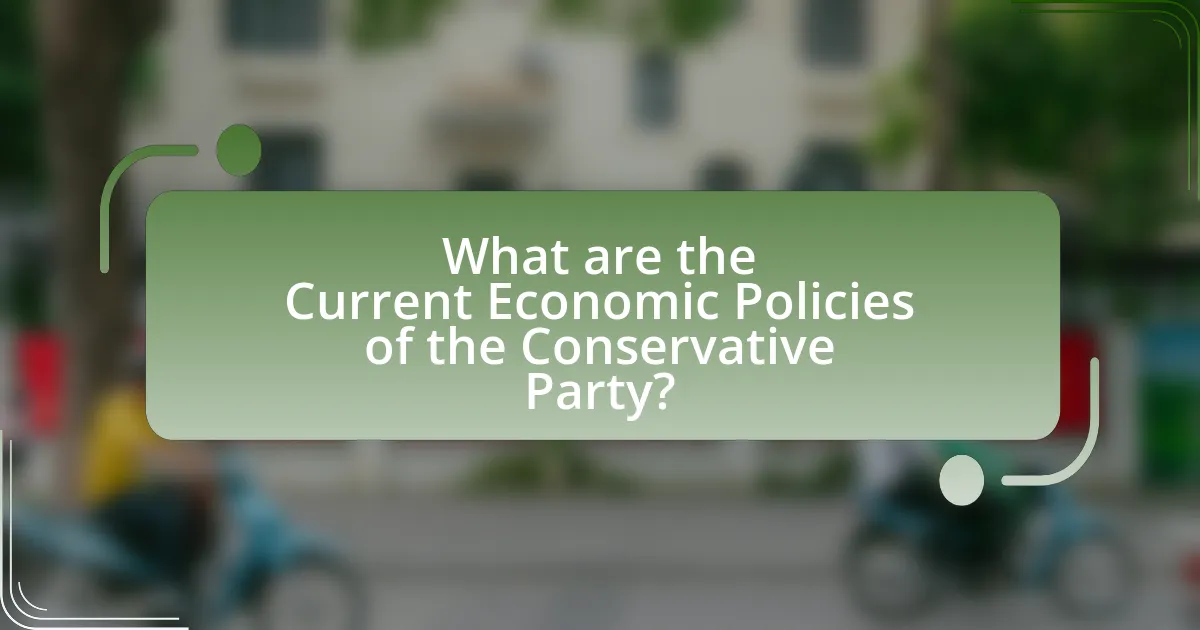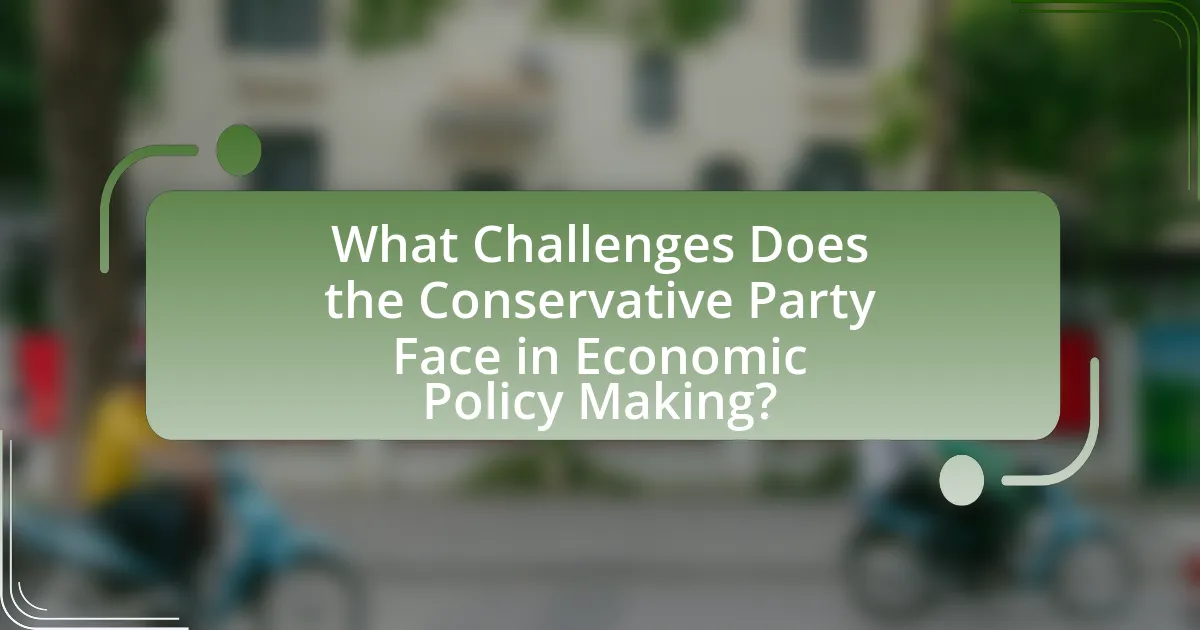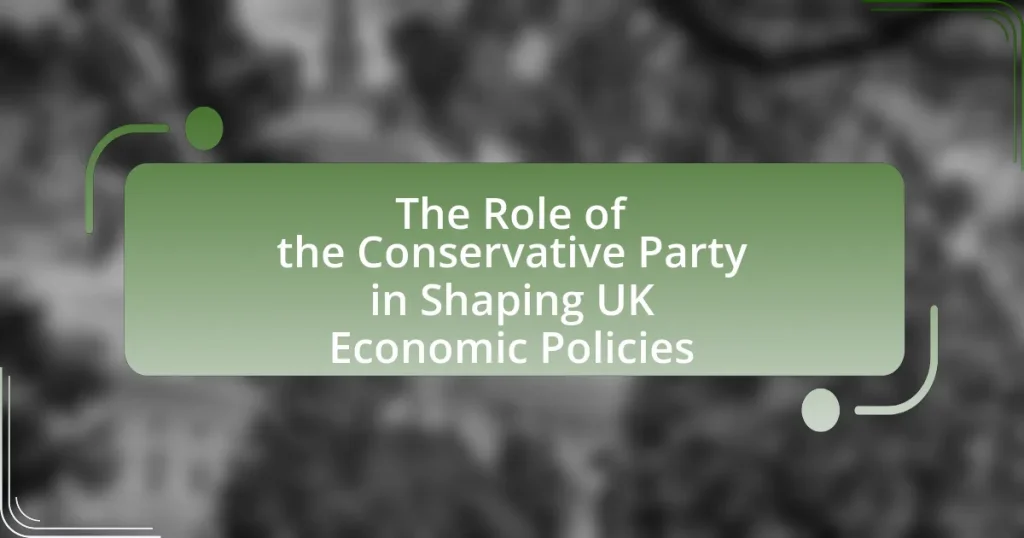The Conservative Party is a pivotal entity in shaping UK economic policies, advocating for free market principles, fiscal conservatism, and reduced government intervention. Historically, the party has implemented significant reforms, such as deregulation and privatization, particularly during Margaret Thatcher’s leadership, which transformed the UK economy. Key policies introduced by the Conservative Party include austerity measures, tax cuts, and initiatives to promote private enterprise and foreign investment. The article examines the evolution of these policies across different Conservative administrations, their impact on various economic sectors, and the challenges faced in addressing public demand for social services while maintaining fiscal responsibility. Additionally, it discusses the implications of current tax policies, trade agreements, and public sentiment on the party’s economic strategies.

What is the Role of the Conservative Party in Shaping UK Economic Policies?
The Conservative Party plays a significant role in shaping UK economic policies by advocating for free market principles, fiscal conservatism, and reducing government intervention in the economy. Historically, the party has implemented policies aimed at lowering taxes, promoting private enterprise, and encouraging foreign investment, which are designed to stimulate economic growth. For instance, during the tenure of Prime Minister Margaret Thatcher in the 1980s, the Conservative government introduced major economic reforms that included deregulation and privatization of state-owned industries, leading to a shift towards a market-oriented economy. Additionally, recent Conservative administrations have focused on austerity measures and reducing the national deficit, which have influenced public spending and welfare policies. These actions demonstrate the party’s commitment to shaping economic policies that prioritize market efficiency and fiscal responsibility.
How has the Conservative Party influenced economic policy in the UK historically?
The Conservative Party has historically influenced economic policy in the UK through a commitment to free market principles, deregulation, and fiscal conservatism. For instance, during Margaret Thatcher’s leadership from 1979 to 1990, the party implemented significant economic reforms, including the privatization of state-owned industries and a reduction in the power of trade unions, which aimed to stimulate competition and reduce government intervention in the economy. These policies contributed to a shift towards a more market-oriented economy, evidenced by the increase in private sector investment and a decline in inflation rates from the high levels of the 1970s. Additionally, the Conservative Party’s emphasis on reducing public spending and lowering taxes has shaped the UK’s economic landscape, promoting a culture of entrepreneurship and individual responsibility.
What key economic policies have been introduced by the Conservative Party?
The Conservative Party has introduced several key economic policies, including austerity measures, tax cuts, and deregulation. Austerity measures were implemented following the 2008 financial crisis to reduce the national deficit, which included significant cuts to public spending. Tax cuts, particularly for corporations and high earners, were aimed at stimulating economic growth and investment. Deregulation efforts focused on reducing red tape for businesses to encourage entrepreneurship and innovation. These policies have been pivotal in shaping the UK’s economic landscape, influencing growth rates and public services funding.
How have these policies evolved over different Conservative administrations?
Economic policies under Conservative administrations have evolved significantly, reflecting changing economic conditions and ideological shifts. For instance, during Margaret Thatcher’s tenure from 1979 to 1990, policies focused on deregulation, privatization of state-owned enterprises, and reducing the power of trade unions, which aimed to combat inflation and stimulate economic growth. In contrast, the administrations of John Major (1990-1997) and David Cameron (2010-2016) shifted towards a more centrist approach, emphasizing fiscal responsibility and social welfare reforms while maintaining some elements of privatization. Notably, Cameron’s government introduced austerity measures in response to the 2008 financial crisis, which included significant cuts to public spending. More recently, Boris Johnson’s administration (2019-2022) sought to address regional inequalities and invest in infrastructure, marking a departure from strict austerity towards a more interventionist economic strategy. This evolution illustrates how Conservative economic policies have adapted to both domestic challenges and global economic trends.
What are the core economic principles of the Conservative Party?
The core economic principles of the Conservative Party include free market capitalism, fiscal conservatism, and a focus on individual responsibility. Free market capitalism emphasizes minimal government intervention in the economy, promoting competition and entrepreneurship as drivers of growth. Fiscal conservatism advocates for balanced budgets, reduced public spending, and lower taxes to stimulate economic activity. The principle of individual responsibility encourages self-reliance and personal accountability, suggesting that individuals should take charge of their economic well-being rather than relying on state support. These principles have historically guided the Conservative Party’s policies, influencing key economic decisions and reforms in the UK.
How do these principles align with broader economic theories?
The principles of the Conservative Party align with broader economic theories by emphasizing free market capitalism, fiscal responsibility, and limited government intervention. These principles reflect classical economic theories, particularly those of Adam Smith, who advocated for the “invisible hand” of the market to drive economic growth and efficiency. Additionally, the Conservative Party’s focus on reducing public spending and promoting private enterprise aligns with neoliberal economic theories that prioritize deregulation and privatization as means to enhance economic performance. Historical evidence shows that Conservative-led governments in the UK, such as those under Margaret Thatcher in the 1980s, implemented policies that reduced state control over the economy, which resulted in significant economic restructuring and growth, supporting the validity of these principles within the context of broader economic theories.
What role does fiscal conservatism play in their economic strategies?
Fiscal conservatism plays a central role in the economic strategies of the Conservative Party by prioritizing balanced budgets, reducing public debt, and minimizing government spending. This approach aims to foster economic stability and growth by ensuring that government finances are managed prudently, which is evidenced by the party’s historical commitment to austerity measures during economic downturns, such as the post-2008 financial crisis. The Conservative Party’s fiscal policies often emphasize tax cuts and deregulation as means to stimulate investment and consumer spending, reinforcing their belief that a smaller government footprint leads to a more efficient economy.
What impact has the Conservative Party had on specific economic sectors?
The Conservative Party has significantly impacted various economic sectors in the UK, particularly through policies that emphasize deregulation, privatization, and austerity measures. For instance, the party’s privatization initiatives in the 1980s transformed the telecommunications and energy sectors, leading to increased competition and efficiency; British Telecom and British Gas were privatized, resulting in substantial investment and innovation. Additionally, the Conservative Party’s focus on austerity post-2008 financial crisis affected public services and welfare sectors, leading to budget cuts that influenced healthcare and education funding. These policies have shaped the economic landscape, driving growth in some areas while creating challenges in others, such as increased inequality and pressure on public services.
How has the Conservative Party’s approach affected the financial services sector?
The Conservative Party’s approach has significantly influenced the financial services sector by promoting deregulation and fostering a competitive environment. This strategy, particularly evident during the 2010-2015 government, aimed to enhance the UK’s position as a global financial hub. For instance, the Financial Services Act 2012 was introduced to streamline regulatory processes and reduce burdens on financial institutions, which led to increased investment and innovation within the sector. Additionally, the Conservative Party’s emphasis on free market principles has encouraged foreign investment, contributing to the sector’s growth and resilience, as evidenced by the UK’s financial services generating £132 billion in exports in 2020.
What changes have occurred in the manufacturing sector under Conservative policies?
Under Conservative policies, the manufacturing sector in the UK has experienced significant changes, including a focus on deregulation, privatization, and an emphasis on innovation and technology. These policies have led to a reduction in government intervention, which aimed to enhance competitiveness and efficiency within the sector. For instance, the Conservative government implemented measures that encouraged foreign investment and supported the development of high-tech industries, resulting in a shift towards advanced manufacturing. According to the Office for National Statistics, the manufacturing output increased by approximately 2.5% annually during certain periods of Conservative governance, reflecting the positive impact of these policies on productivity and growth in the sector.

What are the Current Economic Policies of the Conservative Party?
The current economic policies of the Conservative Party focus on fiscal responsibility, tax reduction, and promoting free market principles. The party aims to reduce the national debt while encouraging economic growth through lower taxes for individuals and businesses, which they argue stimulates investment and job creation. For instance, the Conservative government has implemented policies such as increasing the personal tax allowance and reducing corporation tax rates, which are designed to enhance disposable income and attract foreign investment. These policies are supported by the party’s commitment to maintaining a balanced budget and reducing public spending in non-essential areas, thereby reinforcing their stance on economic prudence and growth.
How do current Conservative economic policies address inflation and cost of living?
Current Conservative economic policies address inflation and cost of living primarily through fiscal measures aimed at reducing public spending and promoting economic growth. The government has implemented tax cuts and incentives for businesses, which are designed to stimulate investment and job creation, thereby increasing wages and reducing the burden of living costs on households. For instance, the Conservative government has focused on lowering corporation tax rates to encourage business expansion, which can lead to higher employment and wage growth. Additionally, measures such as targeted support for energy costs and adjustments to welfare benefits aim to alleviate immediate financial pressures on families. These strategies are supported by economic data indicating that lower taxes can enhance disposable income, contributing to consumer spending and overall economic resilience.
What measures have been proposed to combat rising living costs?
Measures proposed to combat rising living costs include tax cuts, increased support for low-income households, and targeted subsidies for essential goods. The Conservative Party has suggested raising the income tax threshold to alleviate financial pressure on workers, which would allow individuals to retain more of their earnings. Additionally, the government has proposed expanding the energy price cap to protect consumers from soaring energy bills, a move aimed at stabilizing household expenses. These measures are supported by economic analyses indicating that tax relief can stimulate consumer spending and improve overall economic resilience.
How effective have these measures been in practice?
The measures implemented by the Conservative Party in shaping UK economic policies have been effective in promoting economic growth and reducing unemployment. For instance, between 2010 and 2019, the UK experienced a consistent decline in the unemployment rate, which fell from 7.9% to 3.8%, largely attributed to policies aimed at fiscal consolidation and labor market reforms. Additionally, the UK’s GDP growth averaged around 1.8% annually during this period, indicating a positive economic trajectory influenced by Conservative policies such as tax cuts and deregulation. These statistics demonstrate the tangible impact of the Conservative Party’s measures on the UK economy in practice.
What is the Conservative Party’s stance on taxation?
The Conservative Party advocates for lower taxes as a means to stimulate economic growth and encourage investment. This stance is rooted in the belief that reducing the tax burden on individuals and businesses fosters entrepreneurship and job creation. Historically, Conservative governments have implemented tax cuts, such as the reduction of the corporation tax rate from 28% in 2010 to 19% in 2017, to promote economic activity and attract foreign investment.
How do current tax policies reflect Conservative economic ideology?
Current tax policies in the UK reflect Conservative economic ideology through a focus on lower taxes, reduced government spending, and incentives for business investment. The Conservative Party advocates for tax cuts as a means to stimulate economic growth, arguing that lower taxes increase disposable income for individuals and enhance profitability for businesses. For instance, the reduction of the corporation tax rate from 28% in 2010 to 19% in 2017 exemplifies this approach, aiming to attract foreign investment and encourage domestic business expansion. Additionally, the Conservative government has emphasized fiscal responsibility, prioritizing budget deficits reduction and public sector efficiency, which aligns with their belief in limited government intervention in the economy.
What are the implications of these tax policies for individuals and businesses?
The implications of tax policies for individuals and businesses include changes in disposable income and investment behavior. For individuals, tax cuts can increase disposable income, leading to higher consumer spending, while tax increases may reduce spending capacity. For businesses, favorable tax policies can enhance profitability and encourage investment, whereas higher taxes can deter expansion and innovation. Historical data from the Office for Budget Responsibility indicates that tax changes directly influence economic growth rates, demonstrating the significant impact of these policies on both sectors.
How does the Conservative Party approach trade and international relations?
The Conservative Party approaches trade and international relations by prioritizing free trade agreements and strengthening global partnerships. This strategy is evident in their post-Brexit trade policy, which aims to establish new trade deals with countries outside the European Union, such as the Comprehensive and Progressive Agreement for Trans-Pacific Partnership (CPTPP). The party emphasizes the importance of reducing trade barriers and promoting British exports, as seen in their commitment to negotiating bilateral agreements that enhance market access for UK businesses. Additionally, the Conservative Party advocates for a robust international presence, supporting initiatives that bolster the UK’s role in global economic governance and trade organizations.
What trade agreements have been prioritized by the Conservative government?
The Conservative government has prioritized several trade agreements, notably the UK-Australia Free Trade Agreement and the UK-Japan Comprehensive Economic Partnership Agreement. These agreements aim to enhance trade relations and open markets for British goods and services. The UK-Australia agreement, finalized in June 2021, is expected to increase trade by £10.4 billion, while the UK-Japan agreement, effective from January 2021, is projected to boost trade by £15.2 billion. These initiatives reflect the Conservative government’s commitment to establishing new trade partnerships post-Brexit.
How do these agreements impact the UK economy?
These agreements significantly impact the UK economy by influencing trade relationships, regulatory frameworks, and investment flows. For instance, post-Brexit trade agreements have aimed to reduce tariffs and enhance market access for UK goods, which can stimulate economic growth. According to the Office for Budget Responsibility, the UK economy could see a long-term GDP increase of approximately 0.2% to 0.5% from new trade deals. Additionally, these agreements can attract foreign direct investment by providing a stable and predictable business environment, further contributing to economic expansion.

What Challenges Does the Conservative Party Face in Economic Policy Making?
The Conservative Party faces significant challenges in economic policy making, primarily due to balancing fiscal responsibility with public demand for social services. This tension is evident in the need to manage national debt while addressing issues such as healthcare funding and welfare support. For instance, the UK’s national debt reached approximately £2.2 trillion in 2023, prompting debates on austerity versus investment in public services. Additionally, the party contends with internal divisions regarding tax policies and spending priorities, which complicate consensus-building and effective governance. These challenges are further exacerbated by external factors such as inflation rates and global economic uncertainties, which influence public sentiment and policy effectiveness.
What are the main criticisms of the Conservative Party’s economic policies?
The main criticisms of the Conservative Party’s economic policies include austerity measures, income inequality, and insufficient investment in public services. Critics argue that austerity, implemented after the 2008 financial crisis, led to cuts in essential services, negatively impacting vulnerable populations. According to the Institute for Fiscal Studies, these measures have contributed to widening income inequality, with the wealthiest benefiting disproportionately from tax cuts. Additionally, opponents claim that the Conservative Party has underinvested in infrastructure and public services, which hinders economic growth and exacerbates regional disparities.
How do critics argue that these policies affect social inequality?
Critics argue that the economic policies implemented by the Conservative Party exacerbate social inequality by disproportionately benefiting wealthier individuals and corporations while neglecting the needs of lower-income groups. For instance, tax cuts for high earners and reductions in corporate tax rates are cited as measures that increase disposable income for the affluent, thereby widening the wealth gap. Additionally, austerity measures, such as cuts to public services and welfare programs, have been shown to disproportionately impact marginalized communities, leading to increased poverty rates and reduced access to essential services. Research from the Institute for Fiscal Studies indicates that the poorest households have seen a significant decline in their real income due to these policies, further illustrating the argument that Conservative economic strategies contribute to growing social inequality in the UK.
What are the environmental concerns associated with Conservative economic strategies?
Conservative economic strategies often prioritize economic growth and deregulation, which can lead to significant environmental concerns. These strategies may promote fossil fuel extraction and industrial expansion, resulting in increased greenhouse gas emissions and habitat destruction. For instance, the UK government’s support for fracking and offshore drilling has raised alarms among environmentalists regarding potential water contamination and biodiversity loss. Additionally, the reduction of environmental regulations under Conservative policies can exacerbate pollution levels, as seen in the rollback of protections for air and water quality. Such actions can undermine efforts to combat climate change and protect natural ecosystems, highlighting the tension between economic objectives and environmental sustainability.
How does public opinion influence Conservative economic policy decisions?
Public opinion significantly influences Conservative economic policy decisions by shaping the priorities and strategies of the party. When the electorate expresses strong preferences for specific economic issues, such as tax cuts or welfare reform, Conservative leaders often adjust their policies to align with these views to maintain electoral support. For instance, during the 2019 general election, the Conservative Party emphasized tax reductions and increased public spending in response to public sentiment favoring economic growth and stability. This alignment with public opinion is crucial, as research indicates that parties that fail to respond to voter preferences risk losing support, as evidenced by the Conservative Party’s electoral strategies over the past decades.
What role do opinion polls play in shaping economic policy?
Opinion polls significantly influence economic policy by providing policymakers with insights into public sentiment and preferences. These polls gauge the electorate’s views on various economic issues, such as taxation, spending, and welfare, allowing political parties, including the Conservative Party, to align their policies with voter expectations. For instance, during the 2019 UK general election, opinion polls indicated strong public support for increased funding in public services, prompting the Conservative Party to adjust its economic messaging to resonate with this sentiment. This responsiveness to polling data can lead to policy shifts aimed at securing electoral support, demonstrating the direct impact of public opinion on economic decision-making.
How has public sentiment shifted regarding Conservative economic policies over time?
Public sentiment regarding Conservative economic policies has shifted from broad support in the 1980s to increasing skepticism in recent years. Initially, during Margaret Thatcher’s leadership, policies such as deregulation and privatization garnered significant approval, as they were credited with revitalizing the economy and reducing inflation. However, following the 2008 financial crisis and subsequent austerity measures, public opinion began to wane, with many citizens expressing concerns over income inequality and public service cuts. Recent surveys indicate a growing preference for more interventionist economic policies, reflecting a shift towards skepticism about the effectiveness of traditional Conservative approaches.
What strategies can the Conservative Party adopt to improve economic outcomes?
The Conservative Party can adopt strategies such as reducing taxation, promoting free market policies, and investing in infrastructure to improve economic outcomes. Reducing taxation can stimulate consumer spending and business investment, as evidenced by the 2010-2015 Conservative government, which implemented tax cuts that contributed to economic growth. Promoting free market policies encourages competition and innovation, which can lead to increased productivity. Additionally, investing in infrastructure, as seen in the National Infrastructure Strategy launched in 2020, can create jobs and enhance economic efficiency by improving transportation and connectivity. These strategies collectively aim to foster a more robust economic environment.
How can the Conservative Party better address the needs of diverse economic sectors?
The Conservative Party can better address the needs of diverse economic sectors by implementing tailored policies that consider the unique challenges and opportunities of each sector. For instance, the party could enhance support for small and medium-sized enterprises (SMEs) through tax incentives and reduced regulatory burdens, as SMEs contribute significantly to the UK economy, accounting for 99.9% of all businesses and employing 60% of the workforce. Additionally, the Conservative Party should prioritize investment in technology and innovation across various sectors, as evidenced by the UK government’s commitment to increase R&D funding to £22 billion by 2024, which can drive growth and competitiveness. By engaging with industry stakeholders to gather insights and feedback, the party can ensure that its policies are responsive and effective in meeting the diverse needs of the economy.
What best practices can be implemented to enhance economic policy effectiveness?
To enhance economic policy effectiveness, best practices include evidence-based policymaking, stakeholder engagement, and regular policy evaluation. Evidence-based policymaking ensures that decisions are grounded in robust data and research, which can lead to more effective outcomes. For instance, the UK government has utilized data from the Office for National Statistics to inform fiscal policies, demonstrating the importance of empirical evidence in shaping economic strategies. Stakeholder engagement involves consulting with businesses, communities, and experts to gather diverse perspectives, which can improve policy relevance and acceptance. Regular policy evaluation allows for the assessment of outcomes against objectives, enabling adjustments to be made in response to changing economic conditions. The UK’s approach to reviewing its economic policies periodically exemplifies this practice, ensuring that policies remain effective and aligned with current economic realities.




